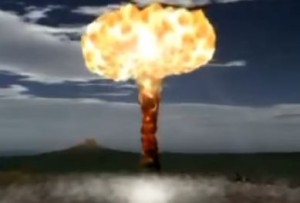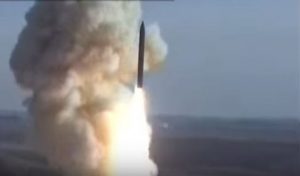![North Korea's Supreme Leader Kim Jong-un inspects what the communist State claims to be hydrogen bomb that can be mounted on a delivery vehicle. [Image credit Korean Central News Agency (KCNA), 3rd Sept. 2017].](https://unicpress.com/wp-content/uploads/2017/09/North-Koreas-Supreme-Leader-Kim-Jong-un-inspects-the-communist-State-claims-to-be-hydrogen-bomb-that-can-be-mounted-on-a-delivery-vehicle.-Image-credit-Korean-Central-News-Agency-KCNA-3rd-Sept.-2017..png)
The New York Times: ‘Seven Critical Truths About North Korea’ By The Interpreter (Max Fisher)
North Korea’s latest intercontinental ballistic missile test has provoked understandable alarm, particularly among Americans worried about the threat.
But many analysts reacted with something closer to grizzled stoicism, greeting the launch as dispiriting but unsurprising confirmation of North Korea’s capabilities and intentions. For them, news of the test, like the missile program itself, is unwelcome and concerning but not too terrifying.
It’s worth reviewing, then, some of the fundamentals that guide those experts’ views of North Korea and its weapons.
(1) It’s over. North Korea is a nuclear power now.
Policymakers will debate for years the precise moment at which the door closed to preventing or rolling back North Korea’s nuclear and missile programs. But that door is most likely now closed.
The North Koreans have little reason to give up their weapons programs, which bring them security against their otherwise vastly superior adversaries, and we have no way to make them.
Well, there’s one way: an invasion. But North Korea’s missiles are mobile, meaning it could fire off at least one or two before the United States could take them out. Full-on war would be virtually guaranteed to bring an attempted North Korean nuclear strike against a major American city. (This assumes North Korea can mount a warhead on a missile, but we have little reason to doubt that it can.)
In technical terms, that is described as a “credible deterrent capability.” In nontechnical terms, it means the world has few options but to accept North Korea’s nuclear status as a fact of life.
(2) North Korea can probably strike Washington and New York now.
Past tests demonstrated that North Korean missiles could reach major West Coast cities in the United States. This test, according to analysts, showed that it can reach East Coast cities now, too. That probably includes Washington and New York.
(3) North Korea is rational, which means it’s unlikely to start a war.
The “good” news is that North Korea has no apparent intention of starting a war, which it would surely lose. In other words, no, North Korea is probably not going to nuke your city out of the blue.
This often gets lost in portrayals of Kim Jong-un, North Korea’s leader, as a wild-eyed lunatic. But while Mr. Kim might be eccentric, he has repeatedly proven himself to be rational. Ruthless and morally reprehensible, but rational. And no rational leader invites national suicide, which is all Mr. Kim would achieve by provoking a war.
The United States has its own nuclear weapons, as well as overwhelming conventional military superiority, to deter North Korea. Historically, deterrence works. It’s how the United States has lived for decades with the threat of Russian and Chinese nuclear weapons.
(4) China might not be able to solve the North Korea problem.
American leaders have, since North Korea’s nuclear program began, invested their hopes and their strategies in China. If only Beijing were properly motivated, the conventional wisdom goes, it could rein in its North Korean ally and neighbor.
But it may be time to consider why this strategy never seems to work.
North Korea is convinced that giving up its nuclear weapons would invite an American invasion, similar to what happened to Libya after it surrendered its own warheads. China can put a lot of pressure on little North Korea, but it’s not clear that such pressure scares Mr. Kim more than the threat of national destruction.
In any case, North Korea and China have been increasingly at odds. North Korea’s weapons tests often seemed timed to humiliate and defy Beijing. China has imposed its own sanctions in response. So while Americans sometimes perceive China as supporting North Korea’s provocations, in fact the opposite is often true.
(5) North Korea has shown it can endure extreme economic punishment.
Even the most severe sanctions might not be able to impose anything that North Korea hasn’t survived before. In the 1990s, the country’s economy and food supply collapsed simultaneously, setting off a faminethat killed up to one-tenth of the population.
Since then, North Korea has improved its agricultural practices. So while Mr. Kim would rather avoid another economic collapse, he probably believes, with some reason, that his country could survive one.
(6) North Korea may not want war, but it’s still scary.
No one knows for sure what Mr. Kim wants except for Mr. Kim, of course. But North Korea’s actions still speak pretty loudly. And they suggest one of two long-term strategies. Analysts disagree about which is more plausible.
What these strategies have in common is a desire to secure North Korea’s place in the world.
Theory one, most widely held among experts, says that North Korea wants to use its weapons to pressure the world into accepting it as a legitimate member of the international community. This, the thinking goes, would bring trade and normalization while keeping Mr. Kim’s government in power, sort of like China’s opening in the 1970s. That’s scary because it means Mr. Kim isn’t giving up until the world accepts his government as it is — cruel, provocative and nuclear-armed.
Theory two, more controversial, says that North Korea ultimately wants to reunify with South Korea. The North can never be truly secure, in this view, as long as the freer and more prosperous South remains independent, implicitly undermining the North’s reason to exist as a separate state. This doesn’t mean invading and conquering South Korea outright, but rather slowly building ties between the two Koreas — and breaking the South away from its American protectors — until they reunify bloodlessly.
(7) Worry, but don’t burst a blood vessel.
The greatest risk, analysts tend to say, is from an accident or miscalculation that might send North Korea and the United States into an unintended conflict. That’s how war would start.
Maybe, for instance, the United States sends a bomber near North Korea as a symbolic threat, but the bomber veers off course toward Pyongyang, which North Korea perceives as the start of a war, leading it to fire missiles in perceived self-defense.
These sorts of scenarios are unlikely, and require a number of things to go wrong. But the odds aren’t zero and, if it happened, entire cities could be destroyed.
It’s hard to know how to conceptualize that sort of high-risk, low-probability event. It’s worth worrying about. But you’re still at far greater risk from, say, smoking. Or a car accident. Or not having sufficient health care.
The Interpreter is a column by Max Fisher and Amanda Taub exploring the ideas and context behind major world events. Follow them on Twitter @Max_Fisher and @amandataub.


